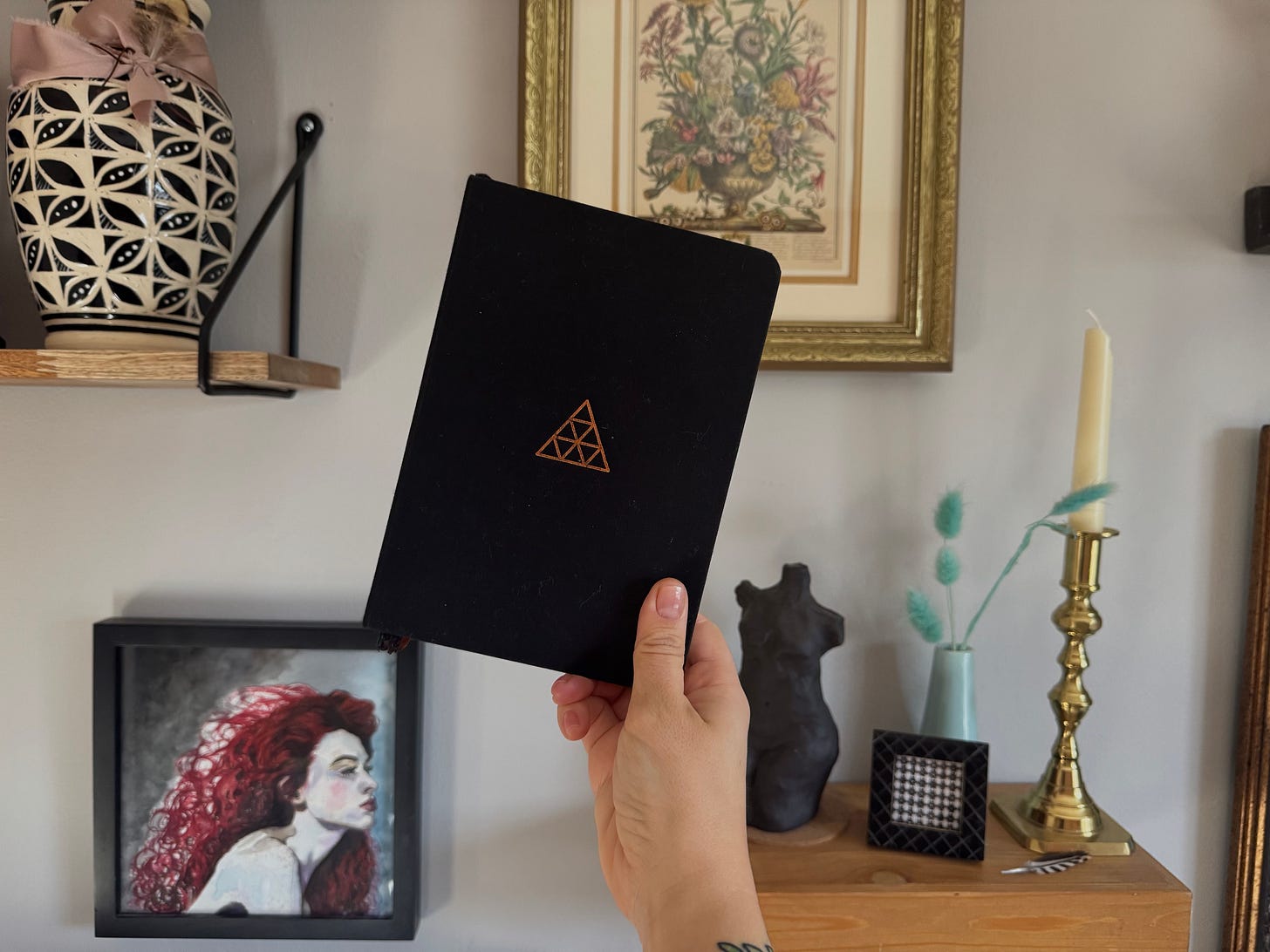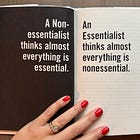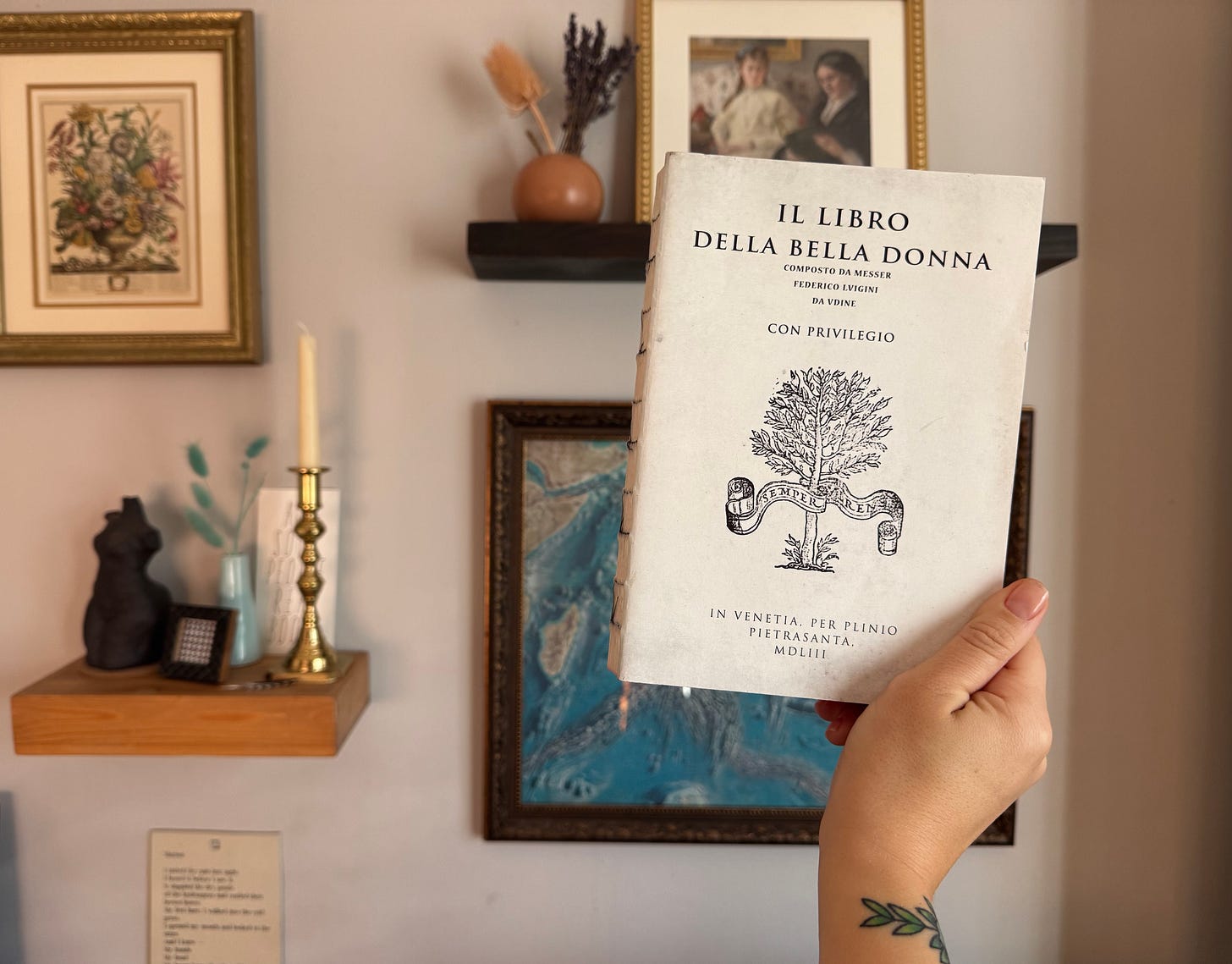Three different and necessary notebooks I use to keep my life on track
Habit tracking, Essentialist thinking, and Didion-style commonplace notebook keeping
Writers are positively seduced by notebooks. They offer so much promise and bring fresh energy to a sometimes tiring pursuit.
I am currently beholden to three very different and very necessary notebooks. Two of them I write in daily; one I write in after I finish reading a book. All them help me keep my life on track.
The Clear Habit Journal
In November of 2019 I was gifted the Clear Habit Journal by my then-boss, and I haven’t missed a day of tracking my habits since.
If habit tracking is new to you, the gist is that at the beginning of each month, you write down habits you want to keep track of (both good and bad habits) so you can really see what it is you do every day. Then, each night, you go through your list and give yourself a check for every habit you did. This is an exceptional awareness tool. It turns out that for me it’s also a useful way to keep my habits in track and make sure I’m doing the things I want to do with my life — and not doing the things I don’t want to do.
With time, I learned that even the thought of checking or not checking off boxes in my habit journal at the end of each day really influences my actions. If I went all day without eating sweets, for example, and then after dinner I spotted a cookie on the counter, I might have a little bit of my dwindling willpower left (willpower diminishes throughout the day) to avoid the cookie.
Were I interested, I could look back on any given day since receiving the journal and see what I was up to then. Was I reading Italian? Was I doing yoga?
Last January I wrote an essay about the book Atomic Habits by James Clear, which was the predecessor to this journal. If habit tracking interests you, I cannot recommend this book enough.
The Essentialism Planner
You may have read the essay I wrote last week about the book that changed my life. It was Essentialism by Greg McKeown — a phenomenal book that revolutionized the way I operate. So when I saw The Essentialism Planner, I knew that was the path I wanted to take for my 2025 daily calendar.
An immediate caveat for me about this is that it’s a 90-day planner, so it’s not going to last me all year. But it seems like something I could do once and keep up after creating the habit over 90 days.
Before we get to the daily planner part, there’s something in the notebook called the Personal Quarterly Offsite, which has you answer three pressing questions:
What’s essential that I’m underinvesting in?
What’s nonessential that I’m overinvesting in?
How can I make it effortless to get the most important things done?
Through several prompts and pages to write the answers down, the planner had me explore what’s essential, eliminate what’s not, and execute a plan to make this easy for me.
Once I finished my Offsite, I was able to begin my daily planning.
The questions asked each day are: what is going on in my life and why does all this matter? Then there’s a page to write down 1 essential project, 2 urgent and essential tasks, 3 maintenance items, and other tasks/notes to help keep you on track.
At the completion of each week (this planner includes Saturdays and Sundays) there is space for a weekly reflection. These two pages have you write down five things you’re grateful for; write up a preview of the upcoming week (things you already have scheduled); write down 2-3 essentials you’re underinvesting in and 2-3 nonessentials you’re overinvesting in. Then you choose the three essential items you want to accomplish over the coming week. Those are your new goals.
I’ve only been doing this for a few days, but I have been thinking about life and work through an Essentialist’s lens since 2016, and I know this is going to keep me going in the right direction.
Commonplace Notebook
This is the newest addition to my stringent notebook-keeping habit, and it was actually inspired by you, the readers of Words on Words.
After the incredible response I got for my 24 most beautiful sentences essay, I realized I had been keeping track of the prose I read in the entirely wrong way. It used to be that I would underline as I read, then shelve the book and begin something new. Sometimes, if I knew I would write about the book or if I found myself underlining a particularly large amount of sentences, I would go through the book and put sticky tabs on all the pages with underlines. Then, at the end of the year — which I started doing in 2020 — I would flip through all the books I read, find my favorite sentences, then write about them.
This worked for me, but it wasn’t optimal. And given how many library books I read, this process posed a challenge. So after hearing dozens of readers say they want to copy beautiful sentences down in a commonplace notebook, I decided I would do it, too.
I picked this blank notebook up in a coffee shop / bookstore in Florence, Italy when I was there last spring. I didn’t know what I purchased it for (see my note above about the seduction of notebooks; I didn’t need a reason). It’s sat on my shelf unused until now, when I finished reading my first book of 2025.
With the new year and my new notebook comes a new habit: copying down all the beautiful sentences I read after finishing a book and before starting a new one. Given that the book I just finished (All the Colors of the Dark by Chris Whitaker) is my mother-in-law’s, I didn’t underline quotes while reading. Instead, I took photos of the page and then highlighted the passage on my phone. It’s not my favorite process, but here’s where the commonplace book comes in beautifully: I transcribed the sentences I loved somewhere I could easily find them. I do not flip through the 28,000 photos on my phone (it’s asinine, I know) to revisit quotes. But what I can do now is flip through my new notebook, and I am really excited about it.
I have other notebooks, too: the notebook I use to write down anything related to the novel I’m working on, plus the two different notebooks I use depending on my mood to take down work and meeting notes. But these three are the ones I am devoted to; the ones that have changed everything for me.
What notebooks do you keep? Those of you who said you’d begin copying down your favorite sentences — how’s it going? Have you come across anything you’d like to share?
I just saw that
wrote a post about his notebooks a couple days ago and it almost made me unschedule this post. But then I reminded myself we are coming from different places, our notebooks are completely different, and both posts are valuable. Be sure to check out how beautiful Austin’s notebooks are.What I’m reading: Madwoman by
. What are you reading?If you found this post useful, please share it! Thank you for reading,
When you purchase books through my links, you support Words on Words (I get credits for more books) and an indie bookstore of your choice at no additional cost to you.











It makes me smile that we have all really found each other on substack with our note taking habits. I used to love notebooks and then it felt excessive having multiple so streamed down to one? And then I was feeling overwhelmed with my clashes of tone in one place. So now I have three! I’ve got my journal for unpacking the trauma and personal shit no one else needs to know, a book journal which enormously helps me with the reviews and a planner which helps me w time and organisation and random note taking ideas. Whenever I look at my stack of 3 notebooks, I smile knowing there’s many of us out here doing the same! I love it - it’s a hobby in-of itself
Wow, I feel seen! And also validated 😂 I need to look into the Clear habit tracker (the one I have is beautiful but not all that practical, so I haven’t been sticking with it). I always have so many on the go too—a regular planner, a phd random thoughts notebook, a reading journal, and then a brain dump sort of situation. I LOVE the idea of a commonplace one too!!